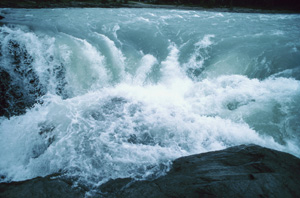Water and energy is the theme of an Earth Day seminar sponsored by the Department of Energy, Environmental & Chemical Engineering.
Paul Bishop, PhD, the Herman Schneider Professor of Environmental Engineering and associate vice president for research at the University of Cincinnati, will deliver the keynote speech “The Water-Energy Nexus” at 11 a.m. Friday, April 23, in Lopata Hall, Room 101. Bishop is serving as environmental engineering program director for the National Science Foundation.

His talk, which is free and open to the public, will focus on the surprising consequences for water conservation of different methods of energy production.
Almost every means of producing energy uses water.
In 2000, thermoelectric power generation (coal, oil, natural gas and nuclear) accounted for 39 percent of all freshwater withdrawals in the United States, according to the abstract of his talk. Some models predict that, by 2030, withdrawals to generate electricity alone will equal the 1995 water consumption of the United States.
Alternative energy technologies won’t necessarily relieve the pressure on water. Both biofuels and coal with carbon sequestration will significantly increase freshwater demands. Even seemingly benign renewable energy systems, such as solar thermal, use a lot of water.
But the picture is not entirely grim. Bishop will present examples of projects the National Science Foundation is funding that might prevent a crisis in one resource from driving a crisis in the other.
Several faculty in the Department of Energy, Environmental & Chemical Engineering are engaged in research related to the energy-environment nexus, according to Pratim Biswas, PhD, the Stifel and Quinette Jens Professor of Environmental Engineering Science and chair of the department.
The scientists are adopting a holistic approach to energy production to ensure that new energy solutions have no unforeseen consequences and will be sustainable into the future even as they meet ever-expanding global demand.
The keynote presentation will be followed by the presentation of undergraduate student awards, a reception and a poster session of research projects completed by doctoral and undergraduate students in the Department of Energy, Environmental & Chemical Engineering.
At 2 p.m., tours of the newly completed Brauer Hall — designed to minimize water use — will be available. All stormwater from the building, for example, will be collected in an underground storage tank and reused.
For more information, call Kim Coleman at (314) 935-5548 or e-mail her at kcole@seas.wustl.edu.